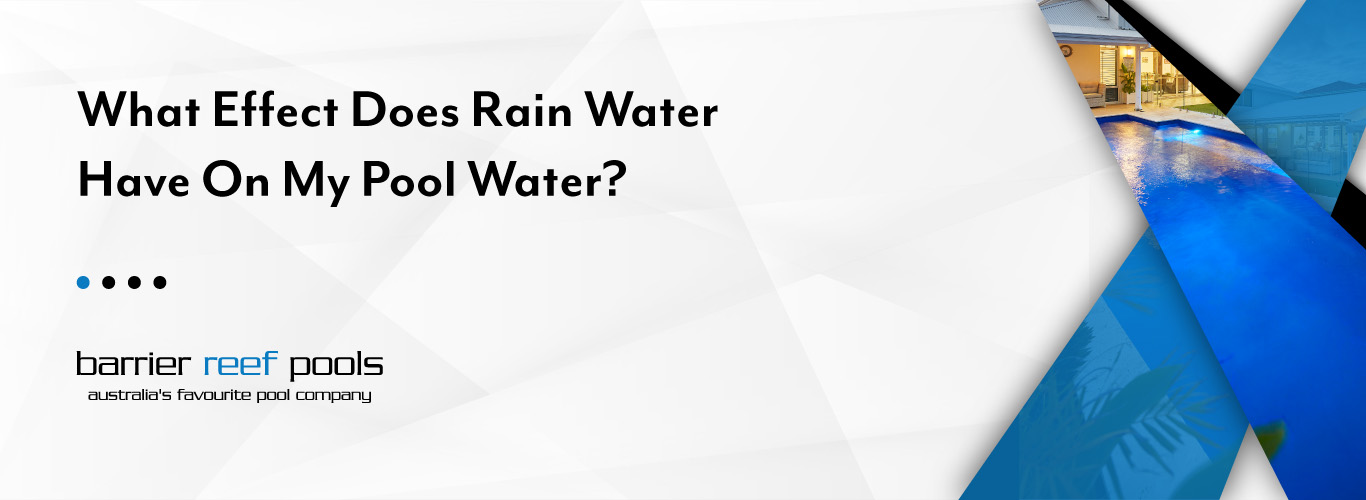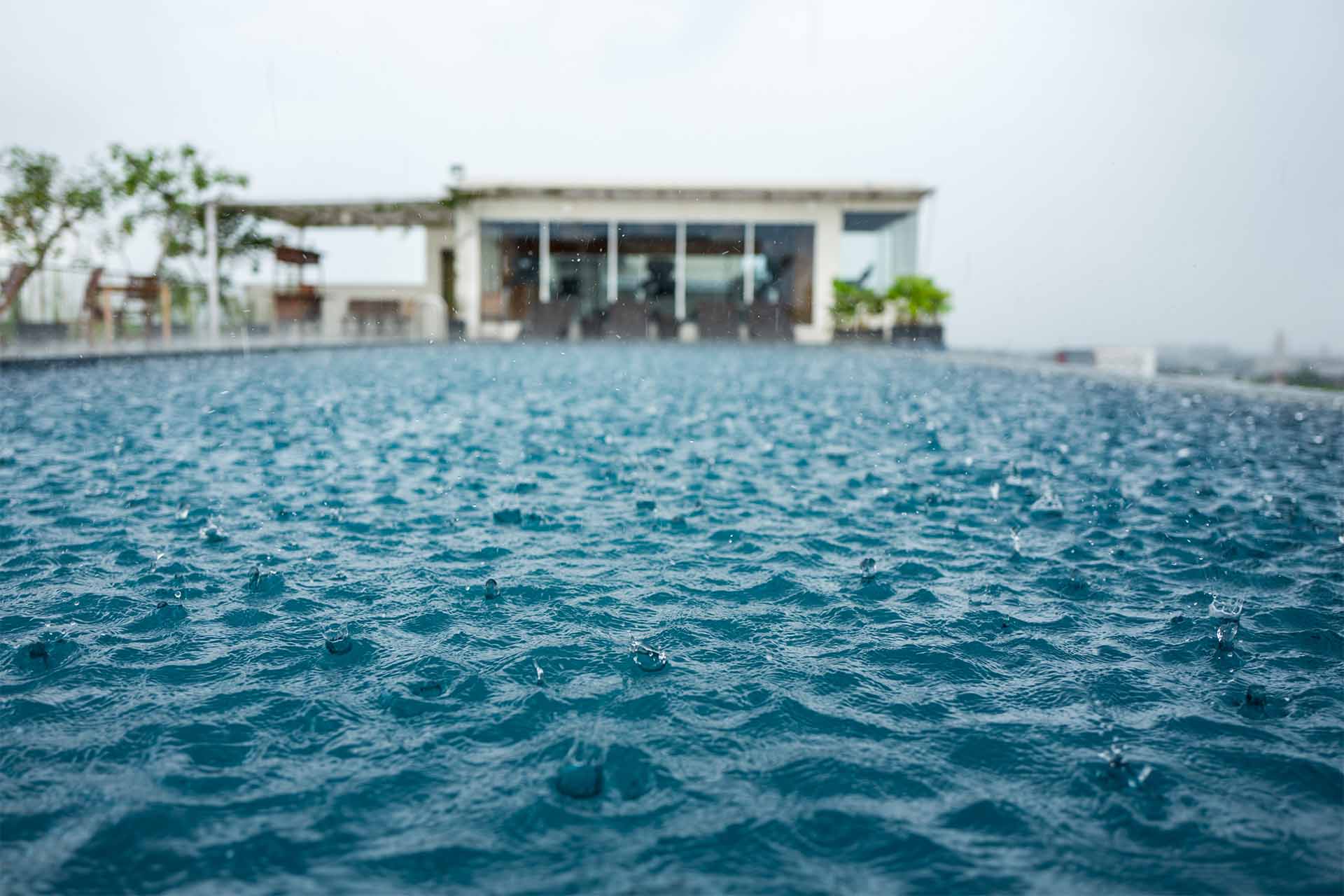What Effect Does Rain Water Have On My Pool?
Keeping your pool clean and sanitary can be a challenge, especially when there are so many external factors that can affect the delicate pH and chemical balance of your pool water. Rainwater is one of the biggest culprits. The slightest imbalance will see your water quality decline and if left untreated, it will turn green quite quickly. Here’s what you need to know about rain and how it affects your pool to help you keep your water looking crystal clear year-round.

Why Is Rain Not Good For My Pool?
There’s no denying that rain can disrupt your pool water, but it usually takes a heavy downpour to dilute your chemicals enough for them to not work properly. In most instances, it’s not the rain itself that wreaks the most havoc on your pool water, it’s the contaminants that the rain brings with it that’s the problem. Air pollution and contamination can contain bacteria and can cause rainwater to become acidic. Clouds are known to hold heavy metals, and when there is a significant downpour, leaf litter, dirt and other organic matter will inevitably make their way into your pool. All these things are bad news for maintaining clean water.
These added pollutants mixed with chlorine inhibits the chlorine from working properly. It doesn’t take long for leaves and debris to start breaking down in your pool, and before you know it you’ve got the perfect environment for algae and bacteria to prosper. Pair this with sunlight, and your pool will be green in a matter of a few days.
It’s not only the chlorine in your pool that rainwater affects but also your pools pH levels, calcium hardness levels, alkalinity, (TDS) total dissolved solids levels and more! Along with your pool chemical levels being thrown out of whack, your pool equipment cannot work to its full potential when the pool is too full. A high-water level prevents the skimmer door from closing, and this allows debris to float back into the swimming pool. If the debris is not removed promptly, it will sink the bottom, start decomposing and disrupting your pH levels.
What Do I Do If My Pool Is Too Full
You will need to empty your pool to the correct level. You can do this by:
- Switching your pump off and turning your multi-port lever on your pump to waste.
- Open valves, if any on the waste line.
- Disconnect your pool cleaner if you have one and remove the vacuum plate from the skimmer box.
- Turn your pump back on and leave it until the water is back to the desired level. Make sure you don’t get distracted and forget about it as the water does empty reasonably quickly.
- Once you’ve got the water to where you want it, turn the pump off again and turn the lever back to the filter setting.
- Reconnect your automatic cleaner and the skimmer plate.
- Now, turn the pump back on.
- If you have emptied the pool past the skimmer line, you will need to top it up because a pool with not enough water is just as bad as a pool with too much water.

How To Clean Your Pool After Rain
You should empty your skimmer basket and remove any debris or dirt you can in your pool. If you have an automatic pool cleaner, you should set this up and run it for the day to pick up finer particles that you are unable to remove with the pool scoop.
How To Check Your Pool's Chemistry Levels
After you have emptied some of your water and removed any debris, you will need to test your water and adjust the levels, if necessary. You can do this using a water testing kit. You simply take a sample of your pool water and dip one of the testing strips into the water. It will provide you with an on-the-spot reading of your pool chemistry. The colours on the strip can be matched with the colour chart on the bottle. If any of them are imbalanced, you can use the correlating chemicals to rebalance your water. If this is something you are not confident doing, it’s a good idea to hire a professional to run you through how to do it, or you can just hire them to take care of it for you.
The Main Chemicals Rainwater Will Effect
When it rains, the most important thing to get right is the chemical balance of your water. It doesn’t matter how much you clean it, without the correct balance, it will turn cloudy, green, or brown. Rain can decrease the Total Alkalinity levels and if it’s acidic, it can lower the pH. The alkalinity works by protecting the pH, so you may notice more change in the alkalinity levels. Contaminants in the water prevent chlorine from working, and this enables algae to multiply faster than the chlorine can kill it.

Here Are Some Of The More Common Chemicals Found In Your Pool And WHat Their Levels Should Be
Chlorine – Ideal chlorine levels are between 1-3ppm.
Ph – Your pH level should sit between 7.4 to 7.6.
Total Alkalinity – Aim for a TA range of 80-120 ppm.
Calcium Hardness – Your CA levels should be from 100-300 ppm.
Total Dissolved Solids – Optimal TDS levels should be from 1500ppm to 3000ppm.
What If My Pool Is Already Green?
Usually, to clear up a green pool, you will need to shock it, which essentially means using a high dose of chlorine to kill the algae. You will also need to balance the pH levels, add a clarifier, oxidiser and use an algaecide. Once you have added the chemicals, you should run your pool pump for at least 24 hours straight. If the pool is brown, rather than green, you should add a floccing agent to bind the dirt particles together so they sink to the bottom. Your pool cleaner will then be able to pick these up much easier.
How To Prevent Rain From Affecting Your Pool Water
As they say, prevention is better than a cure and the easiest and most effective way to prevent rain from disrupting your pools chemical levels is by purchasing a cover. They are a great investment for many reasons. They can drastically reduce the amount of rain and debris that reaches your pool. A pool cover can also prevent heat, water, and chemical loss by more than 70%. If you want to minimise the chances of rain affecting your pool, a pool cover is the smartest way to do so. Usually, hardtop covers are better than roll out versions, however, something is better than nothing at all.
Light rain is unlikely to have any effect on your pool’s water quality, it’s when the rain is set in and you experience heavy downpours that you are likely to see some changes in your pool water. If the rainwater has run through your gardens and then subsequently into your pool, you may notice a change in the colour almost instantly. If you have any questions about rain affecting your pool water, reach out to our highly skilled team here at Barrier Reef Pools, we know a thing or two about pools and would love to help if we can.
